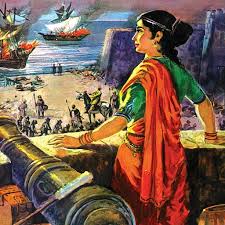Rani Abbakka Chowta: The Indomitable Sea Warrior Queen of Ullal
HINDU NATION


In 1567, the Portuguese army attacked Ullal, showering death and destruction. The great Queen Abbakka resisted it.
A Forgotten Hero of India’s Coastline
In the annals of Indian history, few figures shine as brightly as Rani Abbakka Chowta —a 16th-century queen whose defiance against colonial powers and mastery of naval warfare earned her a place among the subcontinent’s most extraordinary leaders. Often overshadowed by more well-known monarchs, her story is a testament to courage, strategy, and unyielding patriotism.
Early Life and Ascension
Born into the Jain Bunt dynasty around 1525, Abbakka hailed from the coastal kingdom of Ullal , near present-day Mangalore in Karnataka. Even as a girl, she was curious and bold. She learned to swim in the Arabian Sea, rode horses fearlessly, and listened intently to tales of ancient Jain warriors—a tradition her family deeply followed. These stories of valor and discipline shaped her worldview and instilled in her a fierce sense of duty.
Her upbringing was steeped in martial traditions, and she mastered swordsmanship, archery, and statecraft. As per the matrilineal system of her community, she inherited the throne after her marriage to King Jayavira Chowta of the Chowta dynasty. However, their turbulent relationship led to her exile, and Abbakka reclaimed Ullal through sheer determination, becoming its sole ruler.
The Portuguese Threat: Spice Wars and Colonial Ambitions
By the 16th century, the Portuguese Empire sought to monopolize India’s lucrative spice trade. They demanded Ullal pay tribute and allow the construction of a fort in the region. Abbakka refused, sparking decades of conflict. The Portuguese, under Viceroy Dom João Coutinho, launched a brutal campaign to subdue her in 1525.
What followed was a masterclass in asymmetric warfare. Abbakka leveraged her intimate knowledge of the coastal terrain and forged alliances with the Adil Shahi Sultanate of Bijapur and later the Maratha Navy under Kanhoji Angre. Her tactics were unconventional:
Guerrilla Naval Raids : She ambushed Portuguese ships with swift boats, using flaming arrows to set their vessels ablaze.
Local Intelligence Networks : Fishermen and traders acted as spies, relaying enemy movements.
Psychological Warfare : Folklore claims she trained parrots to mimic Portuguese commands, sowing chaos on their ships!
The Battle of 1567: A Defiant Stand
One of her most celebrated victories came in 1567, when the Portuguese besieged Ullal. Abbakka led her troops from the front, repelling multiple assaults. In a daring counterattack, she wounded Admiral Mascarenhas in hand-to-hand combat. Chronicler Gaspar Correia, in Lendas da Índia , noted the Portuguese’s frustration: “This woman fights like a man, and her people would die for her.”
Her resistance wasn’t just military—it was economic. By disrupting Portuguese trade routes, she weakened their hold on the Malabar Coast.
Capture, Escape, and Legacy
Despite her victories, betrayal led to her imprisonment in Goa around 1570. Undeterred, she escaped using a rope made from her sari and returned to Ullal, reigniting the fight. Her later years saw her ally with the Bijapur Sultanate to drive the Portuguese further south.
Abbakka’s legacy endured long after her death (circa 1589). Her strategies influenced later naval leaders like Shivaji Maharaj , who admired her tactics. Today, statues in Bengaluru and Ullal honor her, and Kannada literature immortalizes her as Abhaya Rani (“Fearless Queen”).
Why Rani Abbakka Matters Today
A Woman in Power : In an era dominated by male rulers, she shattered stereotypes, proving women could lead armies and govern fiercely.
Anti-Colonial Resistance : Her defiance predated the 1857 Revolt by centuries, making her one of India’s earliest freedom fighters.
Ecological Stewardship : She protected Ullal’s mangrove forests and coastline, recognizing their strategic and environmental value.
Rediscovering the Warrior Queen
Though colonial records downplayed her role, Indian historians are now reclaiming her story. Recent documentaries and books, like Rani Abbakka: The Warrior Queen by Nanditha Krishna, highlight her contributions. Schools in Karnataka have included her in curricula, ensuring younger generations learn about her bravery.
Final Thoughts
Rani Abbakka Chowta’s tale is more than history—it’s a call to stand firm against oppression, no matter the odds. As the Arabian Sea whispers tales of her valor, her spirit remains a beacon for all who dare to challenge injustice.
“A kingdom that defends its shores with courage needs no walls.” – Inspired by Rani Abbakka’s ethos
Fun Facts! 🤓
1️⃣ Parrot Pal: Legends say her parrot, Maina , would warn her of enemy ships!
2️⃣ Spice Queen: Ullal was famous for pepper, cardamom, and coconut. Yum! 🌿
3️⃣ She’s a Star: A flower found in Karnataka is named Abbakka in her honor! 🌸
4️⃣ No Sword? No Problem: She once hit a Portuguese commander’s crown with a arrow—while riding a horse! 🏇🎯
Curious to learn more? Explore the Ullal Fort ruins or dive into regional folklore that keeps her legend alive! 🌊⚔️
Sources :
Karnataka Gazetteers (1930)
The Forgotten Patriots by Swapan Dasgupta
Folk songs of Tulu Nadu and Portuguese colonial archives.
Note: Some details, like the parrot folklore, blend legend with history, reflecting oral traditions passed down through generations.
